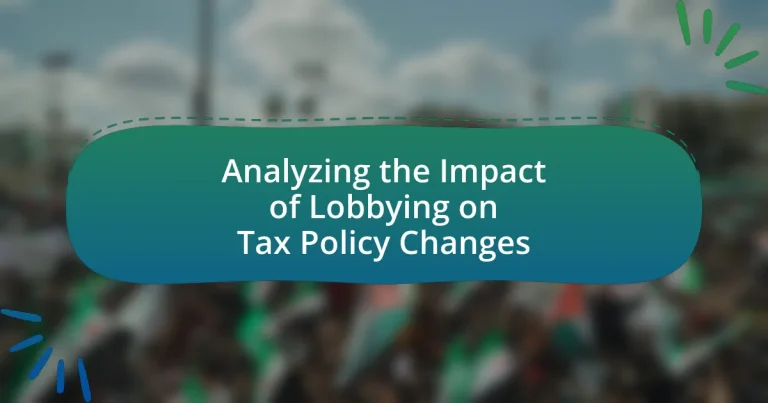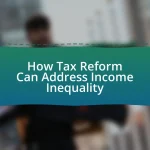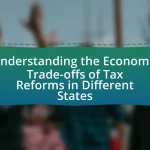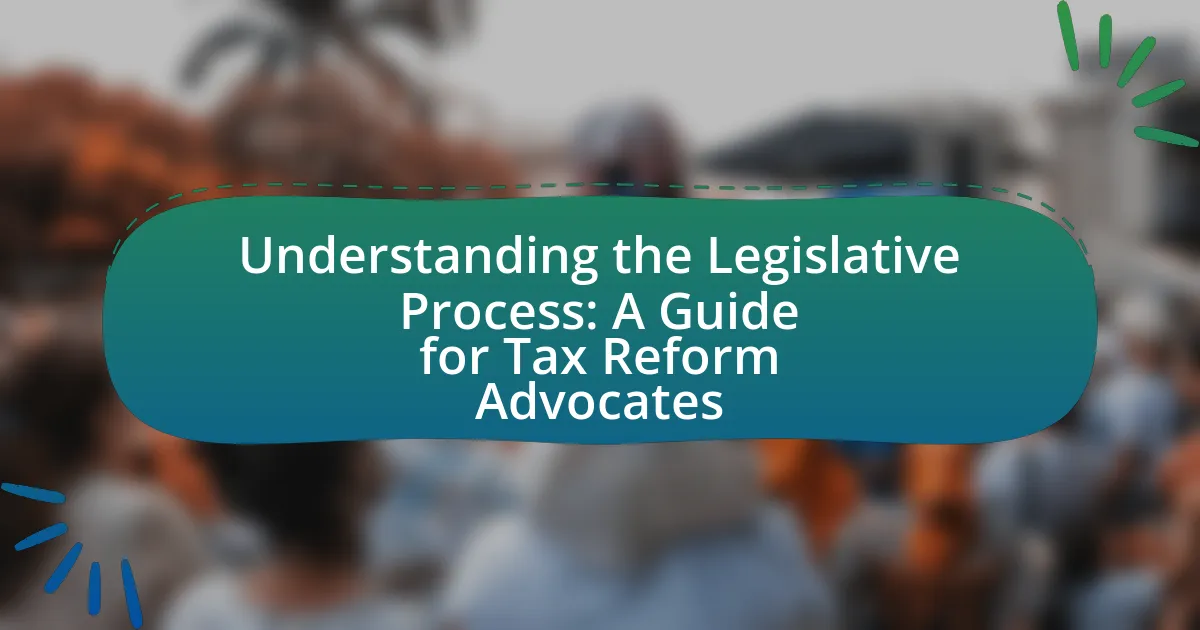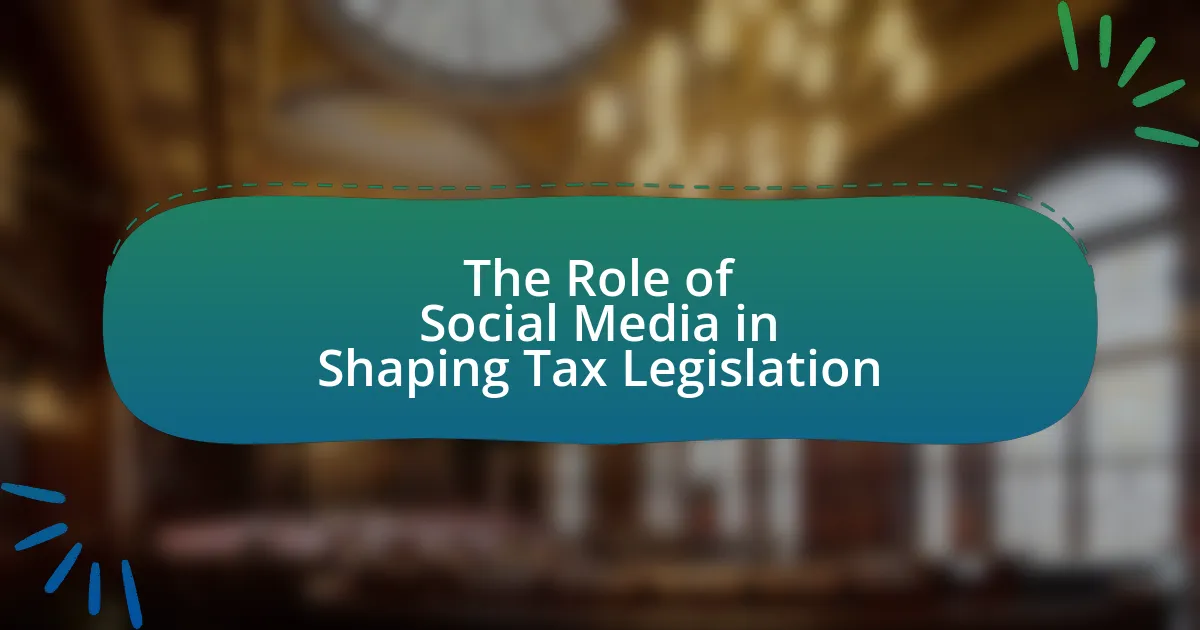The article analyzes the impact of lobbying on tax policy changes, highlighting the critical role lobbyists play in influencing lawmakers and shaping legislative outcomes. It discusses various lobbying strategies, including direct lobbying, grassroots mobilization, and coalition building, and examines how lobbyists identify key decision-makers in tax legislation. The article also explores the implications of industry-specific lobbying, the consequences for tax equity and revenue, and the effectiveness of transparency measures in regulating lobbying activities. Additionally, it addresses best practices for ethical lobbying and the importance of public engagement in promoting fair tax policy outcomes.
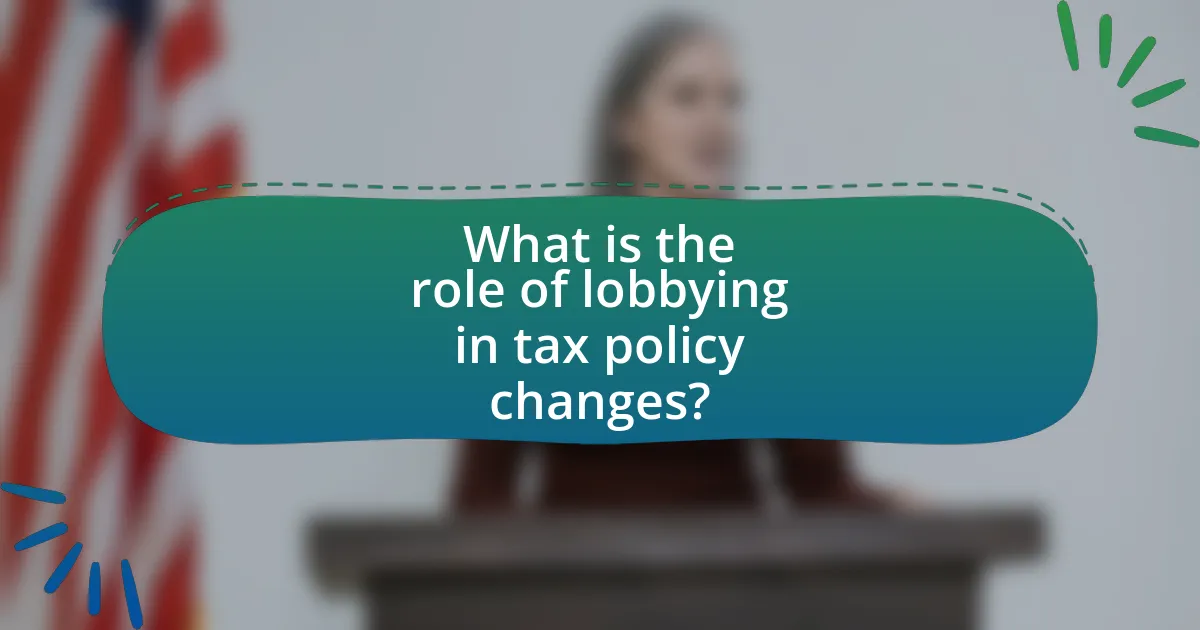
What is the role of lobbying in tax policy changes?
Lobbying plays a critical role in tax policy changes by influencing lawmakers and shaping legislative outcomes. Lobbyists represent various interest groups, including corporations, trade associations, and non-profit organizations, advocating for specific tax policies that align with their interests. For instance, the Tax Cuts and Jobs Act of 2017 was significantly influenced by lobbying efforts from the business sector, which sought lower corporate tax rates. Research indicates that industries with strong lobbying presence, such as pharmaceuticals and technology, often secure favorable tax provisions, demonstrating the tangible impact of lobbying on tax legislation.
How does lobbying influence legislative processes related to tax policy?
Lobbying significantly influences legislative processes related to tax policy by shaping lawmakers’ perceptions and decisions through targeted advocacy and information dissemination. Lobbyists represent various interest groups, such as corporations or non-profits, and provide data, research, and arguments that align with their clients’ objectives, which can lead to favorable tax legislation or amendments. For instance, the Tax Cuts and Jobs Act of 2017 saw extensive lobbying efforts from the business sector, which successfully advocated for lower corporate tax rates, demonstrating how organized lobbying can directly impact tax policy outcomes.
What are the key strategies used by lobbyists in tax policy advocacy?
Lobbyists in tax policy advocacy primarily employ strategies such as direct lobbying, grassroots mobilization, coalition building, and strategic communication. Direct lobbying involves engaging with lawmakers and their staff to influence legislation, often through meetings and providing expert testimony. Grassroots mobilization encourages public support for specific tax policies, leveraging social media and community outreach to amplify their message. Coalition building brings together diverse stakeholders, such as businesses and advocacy groups, to present a united front, enhancing their influence. Strategic communication focuses on crafting persuasive narratives and utilizing data to support their positions, ensuring that their arguments resonate with both policymakers and the public. These strategies are effective as they create a multifaceted approach to influence tax policy, evidenced by the significant changes in tax legislation following coordinated lobbying efforts, such as the Tax Cuts and Jobs Act of 2017, which was shaped by extensive lobbying from various interest groups.
How do lobbyists identify and target key decision-makers in tax legislation?
Lobbyists identify and target key decision-makers in tax legislation by analyzing legislative committees, tracking bill sponsorship, and utilizing political intelligence tools. Legislative committees, such as the House Ways and Means Committee and the Senate Finance Committee, are crucial as they directly influence tax policy. By monitoring which legislators sponsor tax-related bills, lobbyists can pinpoint influential lawmakers. Additionally, political intelligence platforms provide data on voting records, committee memberships, and campaign contributions, enabling lobbyists to strategically engage with decision-makers who have the power to shape tax legislation. This targeted approach is supported by the fact that over 70% of tax legislation originates from these key committees, highlighting their significance in the legislative process.
Why is lobbying considered a significant factor in tax policy formulation?
Lobbying is considered a significant factor in tax policy formulation because it enables interest groups to influence lawmakers and shape tax legislation. Interest groups, such as corporations and trade associations, often employ lobbyists to advocate for specific tax benefits or changes that align with their financial interests. For instance, the Tax Cuts and Jobs Act of 2017 was heavily influenced by lobbying efforts from various sectors, including real estate and energy, which sought favorable tax provisions. This demonstrates how lobbying can directly impact the content and direction of tax policy, making it a crucial element in the legislative process.
What historical examples illustrate the impact of lobbying on tax policy changes?
Historical examples that illustrate the impact of lobbying on tax policy changes include the Tax Reform Act of 1986 and the 2017 Tax Cuts and Jobs Act. In 1986, extensive lobbying by various interest groups, including real estate and corporate sectors, led to significant changes in tax rates and the elimination of numerous tax shelters, resulting in a more simplified tax code. The 2017 tax reform saw aggressive lobbying from corporations and business associations, which influenced the reduction of the corporate tax rate from 35% to 21%, showcasing how lobbying can directly shape tax legislation to favor specific economic interests.
How do public perceptions of lobbying affect tax policy outcomes?
Public perceptions of lobbying significantly influence tax policy outcomes by shaping political agendas and legislative priorities. When the public views lobbying negatively, it can lead to increased scrutiny of lawmakers and pressure to adopt tax policies that favor transparency and equity. For instance, research by the Pew Research Center indicates that 75% of Americans believe that lobbying leads to policies that benefit special interests over the general public, prompting legislators to respond by enacting tax reforms that address these concerns. Conversely, positive perceptions of lobbying can result in more favorable tax policies for the interests being represented, as lawmakers may align their agendas with the priorities of influential lobbyists. Thus, public sentiment acts as a critical feedback mechanism that can either constrain or empower lobbying efforts in shaping tax policy.
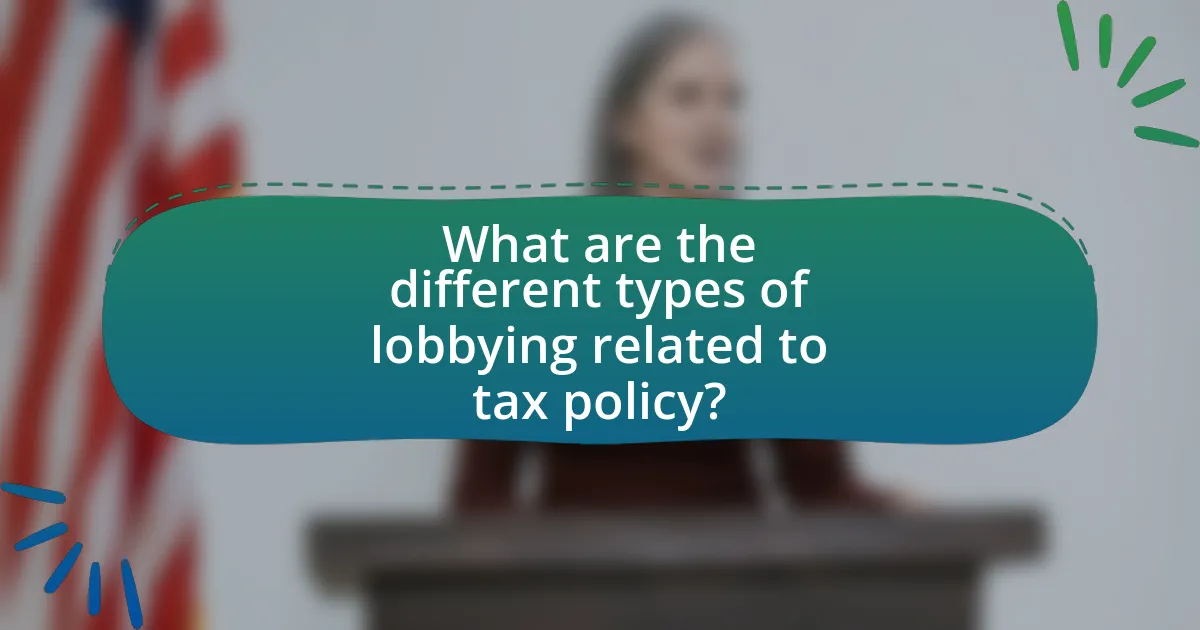
What are the different types of lobbying related to tax policy?
The different types of lobbying related to tax policy include grassroots lobbying, direct lobbying, and coalition lobbying. Grassroots lobbying involves mobilizing the general public to contact legislators and express their views on tax issues, aiming to influence policy through public opinion. Direct lobbying refers to direct interaction between lobbyists and lawmakers or their staff to advocate for specific tax legislation or amendments. Coalition lobbying occurs when multiple organizations or interest groups come together to present a unified front on tax policy issues, enhancing their influence by pooling resources and expertise. Each type plays a significant role in shaping tax policy outcomes by leveraging different strategies to engage with policymakers.
What are the distinctions between direct and indirect lobbying in tax matters?
Direct lobbying in tax matters involves direct interaction between lobbyists and policymakers to influence tax legislation, while indirect lobbying refers to efforts aimed at shaping public opinion or mobilizing grassroots support to indirectly affect tax policy. Direct lobbying typically includes meetings, phone calls, or written communications with legislators, as evidenced by the lobbying disclosure requirements that mandate reporting such activities. In contrast, indirect lobbying often utilizes media campaigns, public relations efforts, or coalition-building to sway public sentiment, which can ultimately pressure lawmakers to consider specific tax reforms. The distinction lies in the method of influence: direct lobbying is a straightforward approach targeting decision-makers, whereas indirect lobbying seeks to create a broader environment conducive to policy change.
How do grassroots lobbying efforts influence tax policy changes?
Grassroots lobbying efforts influence tax policy changes by mobilizing public support to pressure lawmakers. These efforts often involve organizing community members to advocate for specific tax reforms, thereby amplifying the voices of constituents. For instance, campaigns that highlight the impact of tax policies on local communities can lead to increased awareness among legislators, prompting them to consider changes that align with public sentiment. Research indicates that grassroots movements can significantly affect legislative outcomes; for example, the 2017 Tax Cuts and Jobs Act saw substantial public mobilization advocating for and against various provisions, demonstrating how grassroots efforts can shape tax policy discussions and decisions.
What role do political action committees (PACs) play in tax lobbying?
Political action committees (PACs) play a significant role in tax lobbying by financially supporting candidates and political parties that align with their tax policy interests. PACs contribute funds to campaigns, which can influence lawmakers’ positions on tax legislation, thereby shaping tax policy outcomes. For instance, according to the Center for Responsive Politics, in the 2020 election cycle, PACs contributed over $1.5 billion to candidates, with a substantial portion directed towards those advocating for tax cuts or specific tax reforms. This financial backing enables PACs to amplify their influence in legislative discussions, ensuring that their interests are represented in tax policy decisions.
What industries are most active in lobbying for tax policy changes?
The industries most active in lobbying for tax policy changes include technology, pharmaceuticals, finance, and energy. These sectors invest significant resources in lobbying efforts to influence tax legislation that affects their operations and profitability. For instance, the technology industry, represented by major companies like Google and Amazon, often advocates for favorable tax treatment related to digital services and international taxation. The pharmaceutical industry, with companies such as Pfizer and Johnson & Johnson, lobbies for tax incentives related to research and development. The finance sector, including banks and investment firms, seeks to influence tax policies that impact capital gains and corporate taxes. Lastly, the energy industry, particularly fossil fuel companies, actively lobbies for tax breaks and subsidies that support their operations. These industries collectively spend billions annually on lobbying efforts, underscoring their influence on tax policy.
How do specific sectors, like technology or finance, tailor their lobbying efforts?
Technology and finance sectors tailor their lobbying efforts by focusing on specific regulatory issues that directly impact their operations and profitability. For instance, technology companies often lobby for favorable data privacy laws and intellectual property protections, while financial institutions advocate for regulations that enhance market stability and reduce compliance burdens.
In 2020, the technology sector spent approximately $22 billion on lobbying, emphasizing issues like net neutrality and cybersecurity, which are critical to their business models. Conversely, the finance sector invested around $10 billion in lobbying efforts to influence legislation related to banking regulations and tax reforms, reflecting their need to navigate complex financial landscapes. This targeted approach allows both sectors to effectively communicate their interests and influence policymakers in ways that align with their strategic goals.
What are the implications of industry-specific lobbying on tax legislation?
Industry-specific lobbying significantly influences tax legislation by shaping policies that favor particular sectors. This lobbying often results in tax breaks, incentives, or loopholes that benefit specific industries, which can distort fair competition and lead to unequal tax burdens among different sectors. For instance, the oil and gas industry has historically lobbied for tax incentives that reduce their effective tax rates, impacting government revenue and public services. According to a report by the Center for Responsive Politics, the energy sector spent over $100 million on lobbying in 2020 alone, demonstrating the financial power behind these efforts. Such lobbying can also lead to regulatory capture, where the interests of the industry overshadow public interest, ultimately affecting economic equity and fiscal policy.
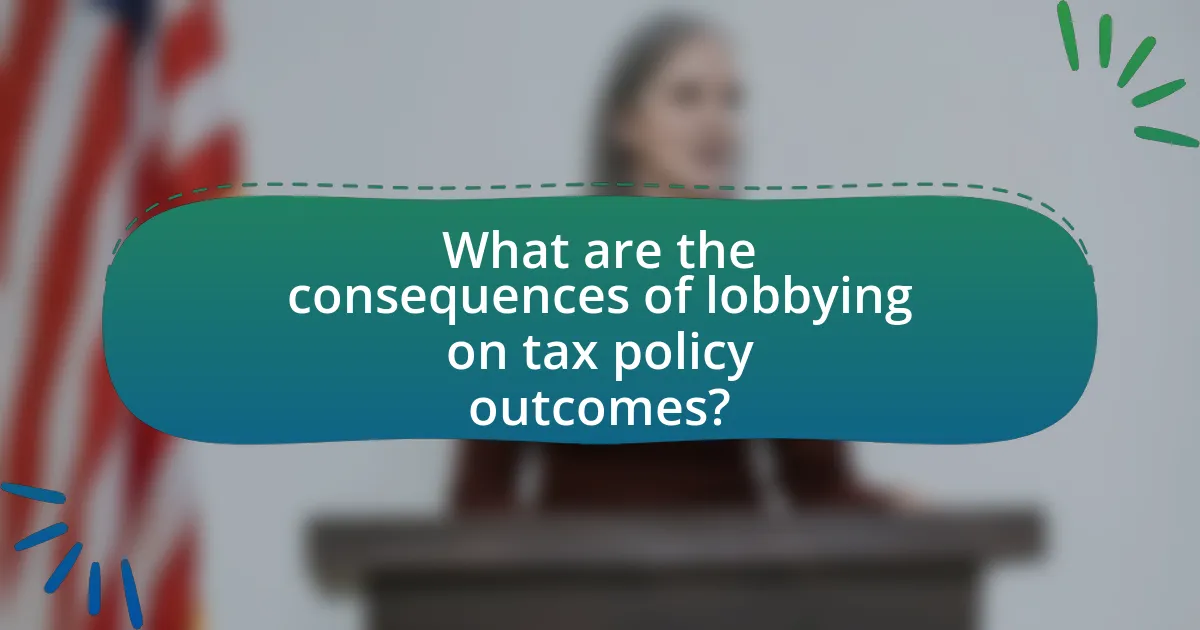
What are the consequences of lobbying on tax policy outcomes?
Lobbying significantly influences tax policy outcomes by shaping legislation to favor specific interests, often resulting in tax breaks or incentives for particular industries. For instance, the Tax Cuts and Jobs Act of 2017, heavily influenced by corporate lobbying, reduced the corporate tax rate from 35% to 21%, benefiting large corporations. This demonstrates how lobbying can lead to substantial shifts in tax policy that prioritize the interests of powerful entities over broader public needs. Additionally, research by the Center for Responsive Politics indicates that industries such as pharmaceuticals and finance spend billions on lobbying, which correlates with favorable tax legislation that often undermines equitable tax structures.
How does lobbying affect equity and fairness in tax policy?
Lobbying significantly influences equity and fairness in tax policy by enabling special interest groups to advocate for tax benefits that disproportionately favor their interests. This often results in tax codes that favor wealthy individuals or corporations, undermining the principle of equitable taxation. For instance, research by the Center for Responsive Politics indicates that industries such as finance and pharmaceuticals spend billions on lobbying, which can lead to tax breaks and loopholes that benefit them at the expense of broader societal equity. Consequently, the tax burden may shift more heavily onto lower-income individuals, exacerbating income inequality and reducing overall fairness in the tax system.
What are the potential negative impacts of lobbying on tax revenue?
Lobbying can negatively impact tax revenue by leading to tax breaks and incentives that disproportionately benefit specific industries or corporations, ultimately reducing the overall tax base. For instance, when lobbyists successfully advocate for tax cuts for large corporations, the government may lose significant revenue that could have been used for public services. A study by the Institute on Taxation and Economic Policy found that corporate tax breaks cost state and local governments approximately $50 billion annually, illustrating how targeted lobbying efforts can diminish tax revenue and exacerbate budget deficits.
How can lobbying lead to tax policy that favors certain groups over others?
Lobbying can lead to tax policy that favors certain groups over others by enabling those groups to exert influence on lawmakers to create favorable tax legislation. For instance, industries with significant lobbying power, such as pharmaceuticals or technology, often secure tax breaks or incentives that benefit their operations, while smaller or less organized groups may not have similar access to policymakers. According to the Center for Responsive Politics, in 2020, the pharmaceutical industry spent over $300 million on lobbying efforts, which contributed to the passage of tax policies that included provisions specifically advantageous to them, such as the ability to deduct certain expenses. This demonstrates how concentrated lobbying efforts can shape tax policy in ways that disproportionately benefit specific sectors or interests.
What measures can be taken to regulate lobbying in tax policy?
To regulate lobbying in tax policy, implementing stricter transparency requirements is essential. This can include mandatory disclosure of lobbying expenditures and the identities of lobbyists, which would allow for public scrutiny of lobbying activities. For instance, the Lobbying Disclosure Act in the United States requires lobbyists to register and report their activities, providing a framework that can be strengthened to enhance accountability. Additionally, establishing a cooling-off period for former government officials before they can engage in lobbying can prevent conflicts of interest and ensure that tax policy decisions are made without undue influence from former officials. These measures can help create a more transparent and accountable lobbying environment in tax policy.
What are the current laws governing lobbying activities related to tax policy?
The current laws governing lobbying activities related to tax policy in the United States are primarily defined by the Lobbying Disclosure Act of 1995, as amended, and the Honest Leadership and Open Government Act of 2007. These laws require lobbyists to register with the federal government and disclose their lobbying activities, including the issues they are lobbying on, the agencies contacted, and the amounts spent on lobbying efforts. Additionally, the Internal Revenue Code imposes restrictions on tax-exempt organizations engaging in lobbying activities, limiting the extent to which they can influence legislation without jeopardizing their tax-exempt status. These regulations aim to promote transparency and accountability in lobbying practices, particularly concerning tax policy changes.
How effective are transparency measures in mitigating lobbying influence?
Transparency measures are effective in mitigating lobbying influence by increasing accountability and public scrutiny of lobbying activities. Research indicates that jurisdictions with robust transparency regulations, such as mandatory disclosure of lobbying expenditures and activities, experience a reduction in the overall influence of lobbyists on policy decisions. For instance, a study by the Center for Responsive Politics found that states with comprehensive lobbying disclosure laws saw a 20% decrease in the number of lobbying-related legislative changes compared to states with weaker regulations. This evidence supports the assertion that transparency measures can significantly limit the power of lobbying by making it more difficult for lobbyists to operate without oversight.
What best practices can be adopted for ethical lobbying in tax policy?
Best practices for ethical lobbying in tax policy include transparency, accountability, and stakeholder engagement. Transparency involves disclosing lobbying activities, funding sources, and the interests represented, which fosters trust and allows for public scrutiny. Accountability requires lobbyists to adhere to legal regulations and ethical standards, ensuring that their actions align with the public interest. Stakeholder engagement emphasizes the importance of including diverse perspectives in the lobbying process, which can lead to more equitable tax policies. Research from the Center for Responsive Politics indicates that transparency in lobbying can reduce corruption and enhance democratic processes, supporting the effectiveness of these best practices.
How can lobbyists ensure their activities promote fair tax policy outcomes?
Lobbyists can ensure their activities promote fair tax policy outcomes by advocating for transparency and equitable representation in tax legislation. By engaging with a diverse range of stakeholders, including underrepresented communities and experts in tax policy, lobbyists can help shape tax laws that address the needs of all citizens rather than a select few. Research indicates that inclusive lobbying efforts lead to more balanced tax policies, as seen in the 2017 Tax Cuts and Jobs Act, which faced criticism for favoring corporations over individuals. Therefore, by prioritizing fairness and inclusivity in their lobbying strategies, lobbyists can contribute to more just tax policy outcomes.
What role does public engagement play in shaping ethical lobbying practices?
Public engagement plays a crucial role in shaping ethical lobbying practices by fostering transparency and accountability in the lobbying process. When the public is actively involved, it encourages lobbyists to adhere to ethical standards, as they are more likely to be scrutinized by informed citizens. Research indicates that increased public participation in policy discussions leads to more equitable outcomes, as seen in the 2016 U.S. election, where grassroots movements influenced lobbying efforts on tax reform. This engagement not only empowers citizens but also compels lobbyists to align their practices with the public interest, thereby enhancing the overall integrity of the lobbying process.
